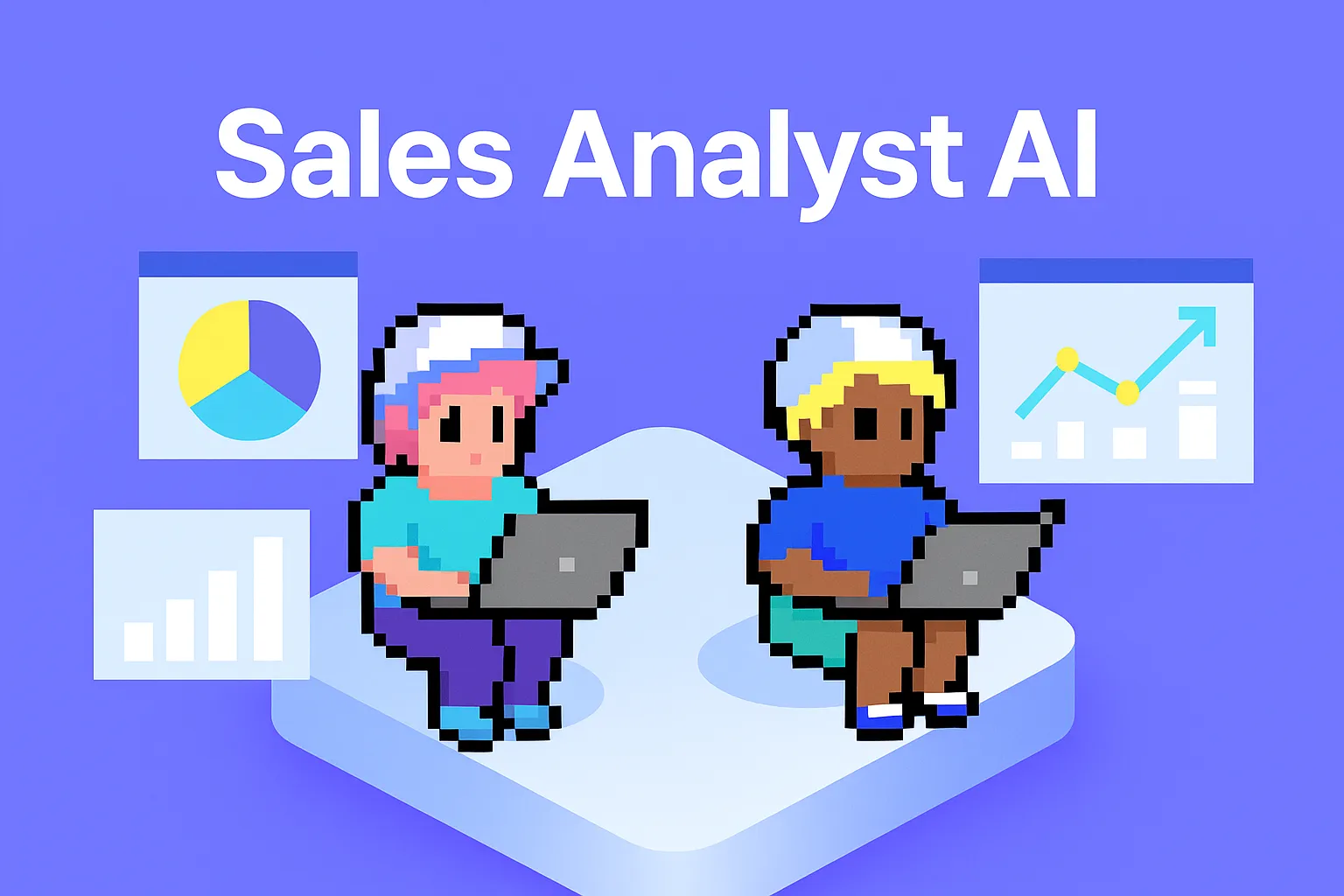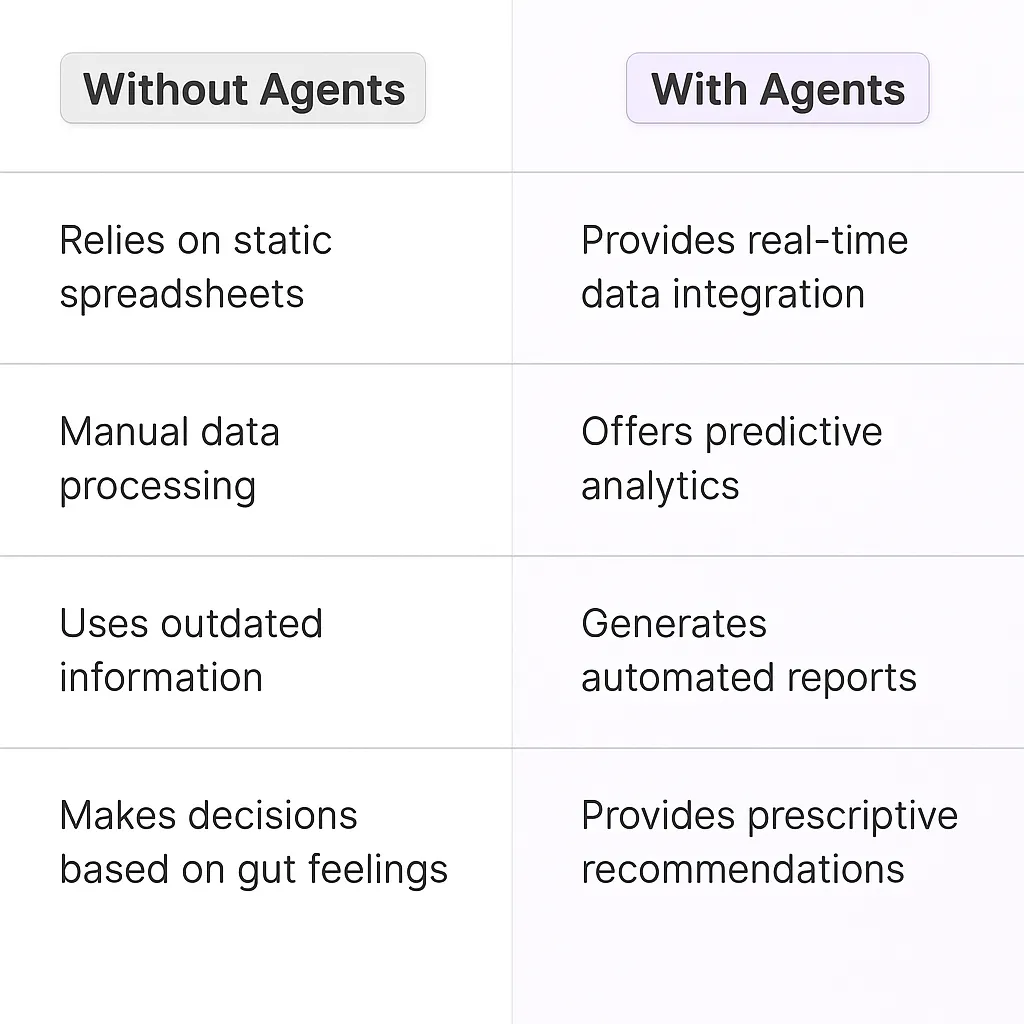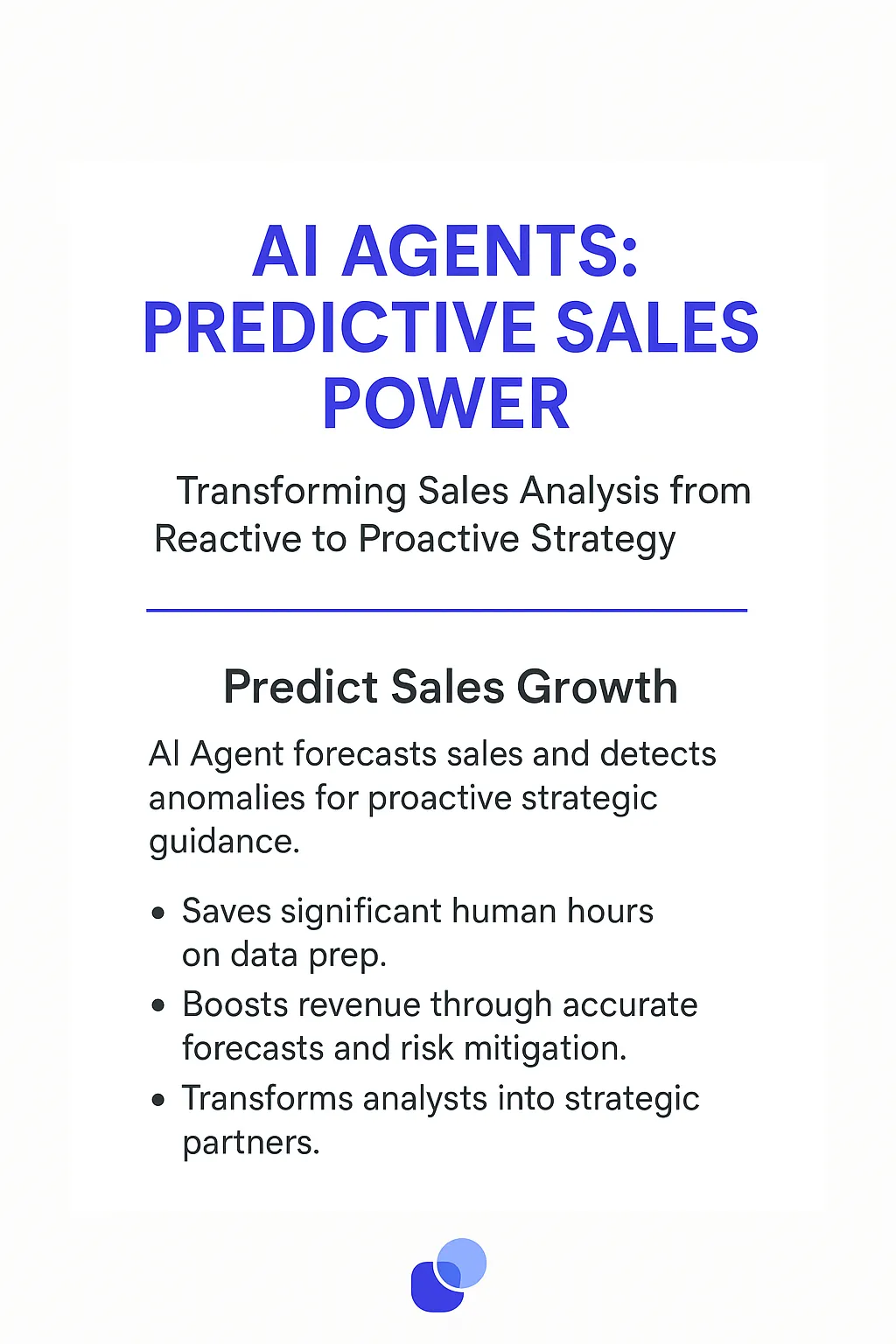A Sales Analyst is a data-driven professional who dissects sales performance, market trends, and customer behavior to inform strategic decisions. They're the bridge between raw data and actionable insights, translating numbers into narratives that guide sales strategies. In the past, their toolkit consisted of spreadsheets, CRM systems, and basic analytics software. Now, with the advent of AI agents, their capabilities have expanded exponentially.
The modern Sales Analyst, empowered by AI agents, boasts an arsenal of game-changing features:1. Predictive Analytics: AI-powered forecasting that anticipates market shifts and customer needs.2. Real-time Data Integration: Seamless aggregation of data from multiple sources for a holistic view.3. Automated Reporting: Generation of comprehensive, visually compelling reports in minutes.4. Personalization at Scale: Tailoring of strategies and recommendations for individual customers or segments.5. Natural Language Processing: Ability to query data and receive insights in plain language.6. Anomaly Detection: Instant flagging of data outliers and potential opportunities or threats.7. Prescriptive Recommendations: AI-generated suggestions for optimizing sales strategies.These features transform the Sales Analyst from a retrospective data interpreter into a forward-thinking strategic partner, capable of driving sales performance to unprecedented heights.

Before AI agents entered the scene, sales analysts were drowning in spreadsheets, wrestling with clunky CRM systems, and spending countless hours manually crunching numbers. They'd rely on static dashboards that were outdated the moment they were created. The tools at their disposal were like trying to perform surgery with a butter knife - technically possible, but painfully inefficient.
Sales teams would often make decisions based on gut feelings or lagging indicators, missing out on real-time opportunities. The disconnect between data collection and actionable insights was a chasm that seemed impossible to bridge. It was a world where the most tech-savvy analyst was king, leaving others in the dust.
Enter AI agents - the game-changers that are redefining what's possible in sales analytics. These digital teammates are like having a team of genius data scientists working 24/7, but without the need for sleep or coffee breaks.
First off, AI agents demolish data silos. They seamlessly integrate data from various sources - CRM, email, social media, market trends - creating a holistic view that was previously unimaginable. This isn't just data aggregation; it's data alchemy, turning raw numbers into golden insights.
Predictive analytics powered by AI agents are next-level. They're not just telling you what happened; they're forecasting what's likely to happen with uncanny accuracy. Imagine knowing which leads are most likely to convert or which customers are at risk of churning before they even realize it themselves. It's like giving your sales team a crystal ball.
Personalization at scale becomes a reality with AI agents. They can analyze customer interactions and preferences to tailor pitches and product recommendations in real-time. This isn't just about sending the right email; it's about crafting the perfect message for each prospect at the exact right moment.
The efficiency gains are staggering. Tasks that used to take days now happen in minutes. AI agents can generate comprehensive reports, identify trends, and flag anomalies faster than any human could. This frees up sales analysts to focus on strategy and high-level decision-making rather than getting bogged down in data analysis and basic number crunching.
Perhaps most importantly, AI agents democratize data analysis. They provide intuitive interfaces and natural language processing capabilities that make complex analytics accessible to everyone on the sales team, not just the data wizards. This creates a data-driven culture where insights flow freely and inform every decision.
In essence, AI agents are transforming sales analysts from reactive data processors into proactive strategic partners. They're not just tools; they're catalysts for a fundamental shift in how sales teams operate and compete in the market. The companies that embrace this shift will find themselves with an insurmountable advantage in the years to come.

Sales analysts are the unsung heroes of revenue generation, diving deep into data to uncover insights that drive business growth. AI agents are poised to become their indispensable digital teammates, augmenting their capabilities and unlocking new levels of productivity. Let's explore how these AI-powered allies can transform the day-to-day operations of sales analysts.
First up, forecasting. AI agents can crunch massive datasets, factoring in historical trends, market conditions, and even social media sentiment to produce more accurate sales projections. They're not just number crunchers; they're pattern recognition machines that can spot correlations humans might miss.
Next, consider lead scoring. AI agents can analyze countless data points about potential customers, from their interaction history to their social media activity, assigning precise scores that help sales teams prioritize their efforts. This isn't just about efficiency; it's about focusing human creativity and relationship-building skills where they'll have the most impact.
Territory planning is another area ripe for AI enhancement. These digital teammates can optimize sales territories based on a complex web of factors including geographic data, customer demographics, and individual rep performance. The result? A more equitable and effective distribution of sales resources.
On a more granular level, AI agents can supercharge the daily tasks of sales analysts. Take data cleaning and preparation, for instance. These digital teammates can automate the tedious process of formatting, deduplicating, and standardizing data from various sources, freeing up analysts to focus on higher-level analysis.
Report generation is another task where AI shines. Instead of spending hours compiling data into presentable formats, sales analysts can lean on AI agents to create visually appealing, insightful reports in minutes. These aren't just static documents; they're interactive dashboards that stakeholders can explore and manipulate in real-time.
Competitive analysis is a critical task that AI can elevate. These digital teammates can continuously monitor competitor activities across various channels, from press releases to social media, providing sales analysts with up-to-date intel that informs strategy.
Finally, consider the potential of AI in customer segmentation. By analyzing vast amounts of customer data, AI agents can identify nuanced segments based on behavior patterns, preferences, and potential lifetime value. This granular segmentation enables hyper-targeted marketing and sales strategies that resonate with specific customer groups.
The integration of AI agents into the sales analyst workflow isn't about replacing human expertise; it's about amplifying it. By offloading routine tasks and enhancing analytical capabilities, these digital teammates free up sales analysts to focus on what humans do best: crafting strategies, building relationships, and driving business growth through insightful decision-making. The future of sales analysis isn't human vs. machine; it's human and machine, working in concert to unlock unprecedented levels of performance and insight.

Sales analyst AI agents are reshaping how businesses approach data-driven decision-making across various sectors. These digital teammates bring a unique blend of speed, accuracy, and adaptability to the table, transforming traditional sales analysis into a dynamic, real-time process. Let's dive into some industry-specific scenarios where these AI agents are making waves:
In e-commerce, sales analyst AI agents are crunching massive datasets to uncover hidden patterns in consumer behavior. They're not just spitting out numbers; they're providing actionable insights that help online retailers fine-tune their product offerings, optimize pricing strategies, and personalize customer experiences at scale.
For B2B software companies, these AI agents are becoming indispensable in decoding complex sales cycles. They're analyzing everything from lead quality to deal closure rates, helping sales teams focus their efforts where they'll have the most impact. It's like having a seasoned sales strategist working 24/7, constantly refining the playbook based on real-world data.
In the automotive industry, sales analyst AI agents are revolutionizing inventory management and demand forecasting. They're processing data from multiple sources - from economic indicators to social media trends - to predict which models will be hot sellers in specific regions. This level of granular insight is helping dealerships stock the right cars at the right time, maximizing sales opportunities and minimizing overhead costs.
These are just a few examples of how sales analyst AI agents are becoming game-changers across industries. As we explore further, we'll see how these digital teammates are not just augmenting human capabilities, but opening up entirely new possibilities in sales strategy and execution.
The retail industry is ripe for disruption, and Sales Analyst AI agents are poised to be the catalyst. These digital teammates are not just crunching numbers; they're decoding the DNA of consumer behavior in ways that would make even the most seasoned retail veteran's head spin.
Take a high-end fashion retailer like Nordstrom. They're sitting on a goldmine of data – purchase histories, browsing patterns, social media interactions – but traditionally, making sense of this data tsunami has been like trying to drink from a fire hose. Enter the Sales Analyst AI agent.
This AI doesn't just spot trends; it predicts them with uncanny accuracy. It's like having a crystal ball that's powered by petabytes of data. The AI can identify that a sudden spike in searches for "neon accessories" among 18-24 year olds in the Pacific Northwest correlates with an upcoming music festival. Before the first pair of day-glo socks even hits the shelves, Nordstrom's buyers are already ahead of the curve.
But it doesn't stop at trend forecasting. These AI agents are masters of personalization at scale. They can craft hyper-targeted marketing campaigns that feel less like spam and more like a personal shopper whispering in your ear. "Hey, remember that leather jacket you've been eyeing? It's now on sale, and here are three ways to style it based on your previous purchases."
The real game-changer, though, is in inventory management. The AI doesn't just tell you what's selling; it tells you why, and more importantly, what will sell next. It's the difference between reacting to trends and creating them. Nordstrom could optimize its stock levels with surgical precision, reducing waste and maximizing profits in a way that would make Wall Street analysts weep with joy.
In essence, Sales Analyst AI agents in retail aren't just tools; they're the secret weapon in the battle for consumer hearts and wallets. They're turning the art of retail into a science, without losing the human touch that makes shopping an experience rather than a transaction. Welcome to the future of retail, where AI doesn't just predict trends – it sets them.
The real estate industry is about to experience a seismic shift, and Sales Analyst AI agents are the tectonic plates. These digital teammates aren't just number crunchers; they're the new power brokers in a market where information is king and timing is everything.
Consider a major player like Zillow. They're sitting on a mountain of data – property values, market trends, user search patterns – but until now, making sense of this information overload has been like trying to solve a Rubik's cube blindfolded. Enter the Sales Analyst AI agent.
This AI doesn't just analyze market trends; it predicts them with eerie precision. It's like having a time machine that runs on algorithms and big data. The AI can detect that a sudden uptick in searches for "eco-friendly homes" among millennials in Austin correlates with new green energy initiatives in the area. Before the first solar panel is installed, Zillow's agents are already positioning themselves as experts in sustainable living spaces.
But the real magic happens in personalization. These AI agents craft hyper-targeted property recommendations that feel less like spam and more like a trusted friend who happens to be a real estate savant. "Hey, I noticed you've been looking at Victorian-style homes. There's a newly listed property that matches your criteria, and here's how its price compares to similar homes in the neighborhood."
The game-changer, though, is in predictive pricing. The AI doesn't just tell you what a house is worth today; it tells you what it will be worth in six months, a year, five years. It's the difference between following the market and shaping it. Zillow could optimize its Zestimate algorithm with unprecedented accuracy, turning their platform from a useful tool into the oracle of real estate.
In essence, Sales Analyst AI agents in real estate aren't just tools; they're the secret weapon in the high-stakes game of property investment. They're transforming the intuition-driven world of real estate into a data-driven powerhouse, without losing the human touch that turns houses into homes. Welcome to the future of real estate, where AI doesn't just predict the next hot neighborhood – it creates it.
Implementing a Sales Analyst AI Agent isn't just about plugging in some fancy algorithm and watching the magic happen. It's more like trying to teach a toddler quantum physics while juggling flaming torches. The first hurdle? Data quality. Your AI is only as good as the data it's fed, and let's face it, most sales data is messier than a teenager's bedroom. You're dealing with inconsistent input formats, missing fields, and enough duplicate entries to make your head spin.
Then there's the integration nightmare. Your shiny new AI needs to play nice with your existing CRM, marketing automation tools, and that ancient ERP system Bob from accounting refuses to let go of. It's like trying to get a cutting-edge smartphone to communicate with a carrier pigeon. And don't even get me started on the API compatibility issues – it's enough to make a grown developer cry.
Let's not forget about scalability. Sure, your AI might work like a charm when analyzing data from your five-person sales team. But what happens when you're suddenly dealing with a global sales force of 500? Your poor little AI agent might just curl up in a digital fetal position and refuse to come out.
On the operational front, you're stepping into a minefield of human resistance. Sales teams are notoriously skeptical of new tech, especially anything that threatens to replace their "gut instincts." Trying to convince a seasoned sales rep that an AI can provide better insights than their 20 years of experience is like trying to sell ice to an Eskimo – in winter.
Then there's the training conundrum. Your AI needs constant fine-tuning to stay relevant, but who's going to do that? Your already overworked IT team? The sales managers who can barely find time for lunch? You might end up needing to hire a full-time "AI Whisperer" just to keep your digital teammate from going rogue.
Privacy and security concerns are another can of worms. Your AI is going to be handling sensitive sales data, customer information, and probably a few trade secrets. One data breach and you're not just losing sales – you're starring in the next big tech scandal headline.
Lastly, there's the ROI question. Implementing an AI Sales Analyst isn't cheap, and the benefits aren't always immediately obvious. Try explaining to your CFO why you need a six-figure budget for a "digital teammate" that doesn't even bring donuts to the office. You'll need the patience of a saint and the persuasive powers of a used car salesman to get this project off the ground.
The integration of AI agents into the Sales Analyst role isn't just an upgrade; it's a paradigm shift. We're witnessing the birth of a new breed of sales professionals who can navigate the complexities of modern markets with superhuman precision and insight. The companies that embrace this fusion of human expertise and AI capabilities will find themselves light-years ahead of the competition.But here's the kicker: this is just the beginning. As AI technology continues to evolve, so too will the role of the Sales Analyst. We're moving towards a future where the line between human and machine intelligence blurs, creating a symbiotic relationship that pushes the boundaries of what's possible in sales strategy and sales execution.The Sales Analysts who thrive in this new landscape won't be those who resist change, but those who lean into it, constantly evolving their skills to complement and leverage AI capabilities. It's a brave new world of sales analytics, and the possibilities are limitless. The question isn't whether AI will transform the role of Sales Analysts - it's how quickly you'll adapt to stay ahead of the curve.